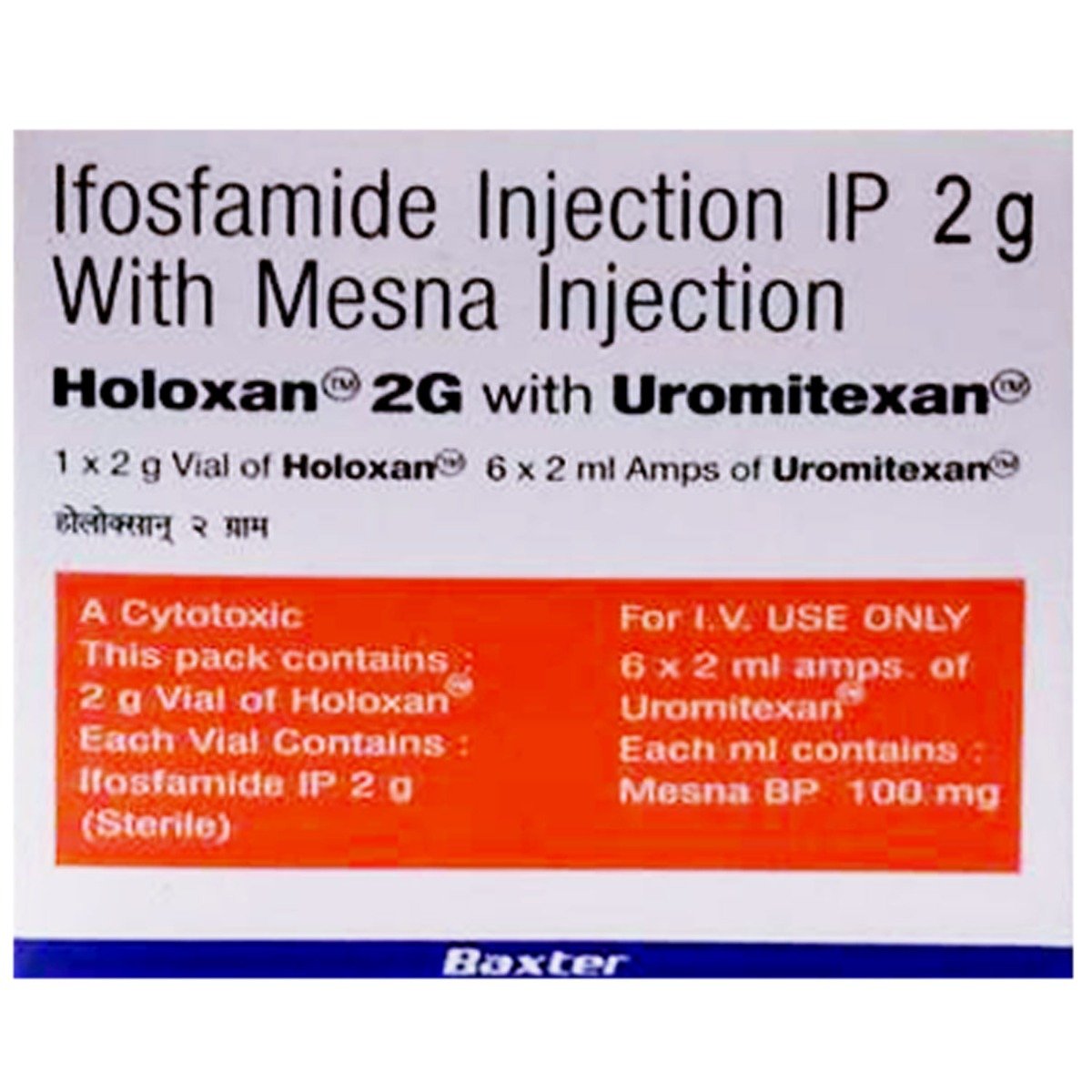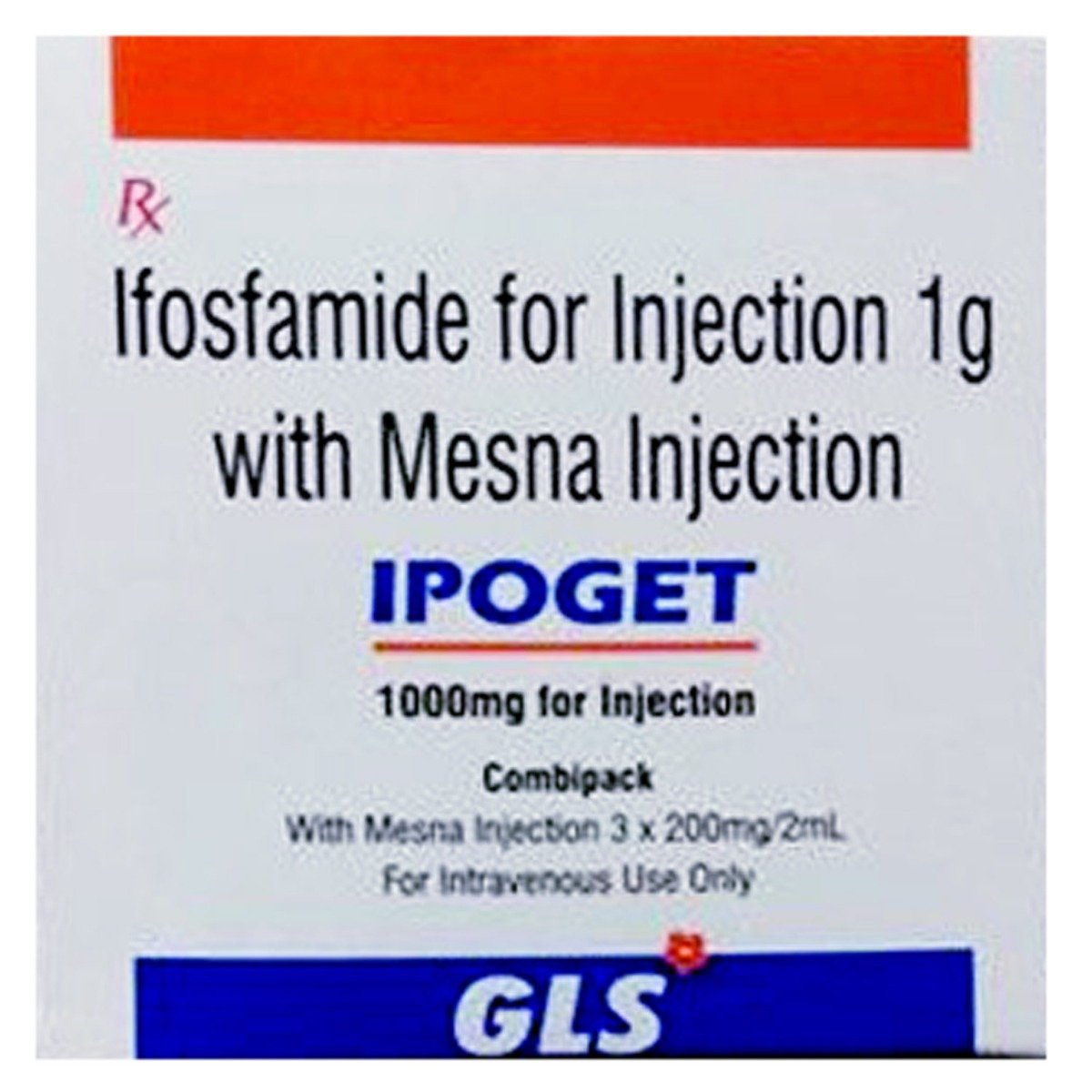Ifosfamide+mesna
About Ifosfamide+mesna
Ifosfamide+mesna is used to treat different cancers such as Blood, breast, non-small cell, ovarian, testicular, and pancreatic cancer. Cancer is a group of diseases characterized by the uncontrolled growth and spread of abnormal cells. These cells can form tumours or spread to other body parts, interfering with normal function.
Ifosfamide+mesna is a combination medication. It contains ifosfamide (antineoplastic agent) and mesna (cytoprotectants). Ifosfamide+mesna works by damaging the genetic material (DNA and RNA) of cancer cells, stopping their growth and multiplication.
Sometimes, you may experience specific side effects such as nausea, diarrhoea, vomiting, loss of appetite, headache, dizziness, hair loss, abdominal pain, pain or redness at the injection site, fever, sore throat, and cough. Most of these side effects will resolve gradually over time and do not require medical attention. However, consult the doctor if you experience these side effects persistently.
Consult your doctor if you are pregnant or breastfeeding. Ifosfamide+mesna may cause dizziness. Therefore, avoid driving or operating heavy machinery unless you are fully alert. Ifosfamide+mesna is safe for children if prescribed by the doctor. Ifosfamide+mesna should not be given to children as its safety and efficacy have not been established. Consumption of alcohol is not recommended while receiving this Ifosfamide+mesna as it may increase the risk of adverse effects such as dizziness, drowsiness, abnormal muscle movements, and seizures. Inform your doctor about your pre-existing medical conditions and if you are taking any other medications to prevent potential side effects.
Uses of Ifosfamide+mesna
Medicinal Benefits
Ifosfamide+mesna belongs to the group of medicines called antineoplastic agents. Ifosfamide+mesna is a combination of two drugs, Ifosfamide (antineoplastic agent) and mesna (cytoprotectants), used to treat different kinds of cancers such as blood cancer, breast cancer, non-small cell lung cancer, ovarian cancer, testicular cancer, and pancreatic cancer. Ifosfamide+mesna works by damaging the genetic material (DNA and RNA) of the cancer cells. This stops their growth and multiplication. Mesna is used along with ifosfamide to protect the bladder from toxic side effects, particularly haemorrhagic cystitis.
Directions for Use
- Follow your doctor's instructions on the dosage and timing of this medication to ensure safe and effective use.
- Ifosfamide+mesna will be administered by the doctor or healthcare professional.
- Do not self-administer.
Storage
Side Effects of Ifosfamide+mesna
- Nausea
- Vomiting
- Abdominal pain
- Diarrhoea
- Dizziness
- Loss of appetite
- Headache
- Hair loss
- Pain or redness at the injection site
- Fever
- Sore throat
- Cough
Drug Warnings
Ifosfamide+mesna should not be administered to individuals if they are allergic to it or its ingredients. Women of childbearing age should use effective birth control during treatment and for at least six months after the last dose to avoid pregnancy. Regular urine and blood tests, including CBC, are required to monitor blood cell counts while receiving Ifosfamide+mesna. Ifosfamide+mesna is not intended for use in conditions like haematuria due to thrombocytopenia or other underlying diseases. It may cause blurry vision and dizziness; therefore, avoid driving or operating heavy machinery while treating with Ifosfamide+mesna. Inform your doctor if you have a history of kidney, heart, liver disease, cystitis, or CNS toxicity before starting therapy with Ifosfamide+mesna. Avoid the consumption of alcohol as it may cause interactions and lead to unpleasant side effects. Ifosfamide+mesna is unsafe during pregnancy and breastfeeding. Patients with infections should exercise caution, and chemotherapy may be temporarily stopped if fever or signs of infection occur. Ifosfamide+mesna may cause bone marrow suppression, decreasing white blood cells and platelets, so regular monitoring is essential.
Drug Interactions
Drug-Drug Interactions: Ifosfamide+mesna may interact with antibiotics (fluconazole, ketoconazole, rifampin), antiepileptic drugs (phenobarbitone, phenytoin), calcium channel blockers (diltiazem), antimetabolites (cisplatin), anti-coagulants (anisindione, warfarin, dicumarol).
Drug-Food Interactions: Ifosfamide+mesna may interact with grapefruit, St. John's wort and alcohol, increasing the risk of side effects.
Drug-Disease Interactions: Inform your doctor if you have heart diseases, liver diseases, kidney diseases, bone marrow suppression, CNS toxicity, cystitis, infections and autoimmune disorders like rheumatoid arthritis (pain and inflammation in the joints), systemic lupus erythematosus (a severe form of lupus in which pain and fatigue occur in joints), or nephritis (a type of kidney problem).
Drug-Drug Interactions Checker List:
Safety Advice

Alcohol
unsafeAvoid alcohol consumption while treatment with Ifosfamide+mesna as it may cause unpleasant side effects.

Pregnancy
unsafeIfosfamide+mesna is not recommended to be used in pregnancy as it may cause serious side effects. Use effective birth control measures during treatment with Ifosfamide+mesna and for 6 months after completing the treatment. Inform your doctor If you get pregnant while you are receiving Ifosfamide+mesna.

Breast Feeding
unsafeIfosfamide+mesna is excreted in breast milk. Ifosfamide has been demonstrated to produce significant adverse effects and tumours in animal tests. It is essential to consider the importance of the medicine to the mother before discontinuing nursing. Ifosfamide should not be taken by women who are breastfeeding.

Driving
cautionSome patients may experience blurred vision or dizziness after using this $ name. If you experience any of these symptoms during treatment, do not drive a vehicle or operate heavy machinery.

Liver
cautionThere were no official investigations undertaken on patients with liver impairment. Ifosfamide+mesna is metabolized extensively in the liver, producing both beneficial and harmful metabolites. It should be administered with caution to patients with poor liver function.

Kidney
cautionThere were no official studies undertaken on people with kidney impairment. The kidneys eliminate Ifosfamide+mesna and metabolites but may accumulate in plasma with impaired renal function. Patients with renal impairment should be continuously watched for toxicity, and dose reduction may be necessary.

Children
cautionIfosfamide+mesna is not recommended for use in children under 12 years of age as its safety and efficacy have not been established.
Habit Forming
Diet & Lifestyle Advise
- Eat protein-rich, low-fat foods like eggs, Greek yoghurt, seafood, lean meats, poultry, beans, soy products, and unsalted nuts.
- Include vitamin A-rich foods like carrots, sweet potatoes, kale, spinach, and apricots.
- Avoid intake of fatty, fried, spicy, and overly sweet foods to avoid nausea.
- Practise good hygiene by staying away from crowded places, and avoiding raw and undercooked food to reduce the risk of infection.
- Avoid refined sugars and carbohydrates, as tumours often use glucose for energy.
- Avoid consumption of alcohol and quit smoking.
- Empty your bladder frequently within 24 hours of chemotherapy; inform your doctor if you experience pain during urination.
- Get at least 8 hours of sleep and rest regularly.
Patients Concern
Disease/Condition Glossary
Blood cancer: Blood cancer begins in blood-forming tissue, such as the bone marrow or the immune system's cells. Examples of blood cancer are leukaemia (a blood cancer caused by a rise in the number of white blood cells in your body), lymphoma (cancer that begins in infection-fighting cells of the immune system, called lymphocytes), and multiple myeloma (cancer that forms in a type of white blood cell called a plasma cell). The symptoms include fever, chills, fatigue, weakness, bone and joint pain, and weight loss.
Ovarian cancer: Ovarian cancer is when abnormal cells in the ovary begin to multiply out of control and form a tumour. If left untreated, the cancer can spread to other parts of the body. This is called metastatic ovarian cancer. Symptoms include abdominal bloating, pressure, pain, abnormal fullness after eating, difficulty eating, increased urination, and an increased urge to urinate.
Breast cancer: Cancer that forms in the cells of the breasts. Breast cancer can occur in women and rarely in men. Symptoms of breast cancer include a lump in the breast, bloody discharge from the nipple, and changes in the shape or texture of the nipple or breast.
Testicular cancer: Testicular cancer occurs in the testicles (testes), located inside the scrotum, a loose bag of skin underneath the penis. Symptoms include a painless lump or swelling on either testicle, pain, discomfort, numbness in a testicle or the scrotum, change in the way a testicle feels, or a feeling of heaviness the scrotum, a dull ache in the lower abdomen or groin. Sudden buildup of fluid in the scrotum.
Pancreatic cancer: Pancreatic cancer is cancer that forms in the cells of the pancreas. Pancreatic cancer begins in your pancreas tissues, an organ in your abdomen that lies behind the lower part of your stomach. Your pancreas releases enzymes that aid digestion and produce hormones that help manage your blood sugar. Symptoms include abdominal pain that radiates to your back, loss of appetite or unintended weight loss, yellowing of your skin and the whites of your eyes (jaundice), light-coloured stools, dark-coloured urine, and itchy skin.
Non-small cell lung cancer: Non-small cell lung cancer is a disease in which malignant (cancer) cells form in the lung tissues. There are several types of non-small cell lung cancer. Smoking is the major risk factor for non-small cell lung cancer. Symptoms include a cough that won't go away, shortness of breath, weight loss, or coughing up blood.
FAQs
Ifosfamide+mesna belongs to the group of medications called antineoplastic agents. It is used to treat blood cancer, breast cancer, non-small cell lung cancer, ovarian cancer, testicular cancer and pancreatic cancer.
Ifosfamide+mesna is an antineoplastic agent. It works by damaging the DNA of cancer cells, preventing their growth and spread. Mesna is used along with ifosfamide to protect the bladder from toxic side effects, particularly haemorrhagic cystitis.
Ifosfamide+mesna may cause diarrhoea as a common side effect. If you experience this symptom, drink plenty of fluids to stay hydrated, eat non-spicy food, get plenty of rest, and take probiotics. Do not take anti-diarrheal medicines on your own without a doctor’s advice.
The side effects of Ifosfamide+mesna include nausea, diarrhoea, vomiting, loss of appetite, headache, dizziness, hair loss, abdominal pain, pain or redness at the injection site, fever, sore throat, and cough. Most of these side effects will resolve gradually over time and do not require medical attention. However, consult the doctor if you experience these side effects persistently.




